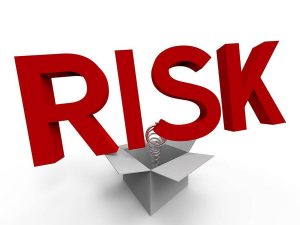What is Risk? How Does it Affect Business Value?

What are the risks in your business, and what can you do to reduce them?
According to Dictionary.com, risk is defined as “the chance of injury or loss; a hazard or a dangerous chance.” In the business valuation context, risk refers to the possibility of financial loss or drop in asset value.
In layman’s terms, the risk in buying a business is that you will overpay for it. The more risk that is associated with an investment, the higher the return that is demanded by the investor. The higher expected returns are achieved when the market places a lower value on a business that is perceived as having higher risk.
In estimating the value of a business, the analysis is based on expected cash flows and the risk that such cash flows will not be received as expected. An astute buyer seeks to minimize risk, through careful evaluation and understanding of the business he or she is considering buying or investing in. As I have said in previous blogs, the evaluation of a closely held business is no different than the evaluation done in purchasing 100 shares of a public company:
- Will the company continue to pay dividends?
- How much will those dividends be?
- What will the shares be worth when you are ready to sell them?
Certain risks, such as the economy in which the business operates, are uncontrollable. Some risks, such as future competition, may be anticipated but others, such as technological obsolescence may come as a complete surprise. Many years ago, a client purchased a chain of successful photographic film developing labs and continued to operate them successfully until the advent of digital photography. The client certainly did his homework, but did not see the change that was coming. Neither did Kodak and look what happened to them!
Controllable risks to consider
If you are buying or selling a business, what are some of the controllable risks that you should look out for? Here are a few of the more common ones:
- Poor accounting records – A company’s accounting records should tell the full financial story of the business. With all the low-cost accounting software that is available, there is no reason that every business should not have great accounting records. A company’s books should speak for themselves; the more stories, explanations, and exceptions, the greater the perceived risk.
- Customer concentration – Is the continued success of the business dependent upon a single customer or a few customers? If the loss of any of these customers would negatively impact the business, that is a significant risk.
- Supplier concentration – Is the business dependent on any suppliers that cannot be quickly and easily replaced? This could be a problem if anything happens to one of those suppliers.
- Key employees – Is the business dependent on the services of one or more employees? Are there enforceable employment contracts and non-compete agreements in place with them? If the business does not have these agreements (signed by all parties and on file), what would happen if those employees went to work for your competitor?
- Foreign competition – Can the product or service offered by the business be purchased at a lower cost from a foreign provider? Everything from tax preparation to manufacturing to technology consulting can be outsourced overseas these days. If this hasn’t affected your business yet, chances are it soon will. What are you doing to remain competitive?
Taking these factors into account, what are the risks in your business, and what can you do to reduce them?
Everything you do to reduce business risk will be a step toward increasing your company’s value. If you’d like a fresh look at the risks inherent in your business, or to discuss the business valuation of your company, contact me at 201.655.7411 or GShanker@krscpas.com.




